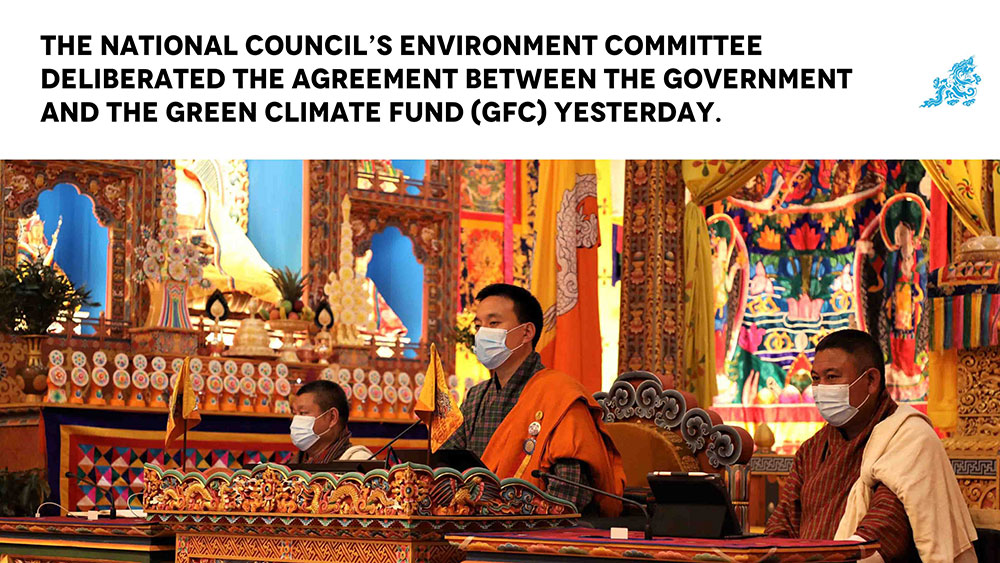The National Council (NC) tabled the agreement between the government and the Green Climate Fund (GFC) agreement on the privileges and immunities of the GFC yesterday.
The government signed the GCF agreement in November 2020. The agreement was deliberated and endorsed by the National Assembly in the fourth session of the Parliament and forwarded to NC for deliberation.
The agreement was presented by Finance Minister Namgay Tshering to the House.
The GCF was created in 2010 to support the efforts of developing countries in responding to the challenge of climate change.
Lyonpo Namgay Tshering said that the immediate benefit of granting the privileges and immunities to the GCF was receiving 100 percent of the fund.
The GCF is not directly received, Lyonpo said, but was routed through an organisation such as the World Bank or the United Nations.
“When the GCF is received from these organisations, service fees (two or five percent of the fund) was deducted,” Lyonpo said.
He said that without the privileges and immunities of the GCF in the country, the fund was based on the routed organisation’s priorities.
Another benefit of the agreement, according to Lyonpo, was its low-interest concessional loans option.
Lyonpo said that in the current situation, investment in the private sector had decreased. “However, as the Covid-19 situation improves, it is likely that the financial institutions’ reserve would not be sufficient because of the increase in the number of private sectors seeking loans.”
GCF’s low-interest concessional loans could enable the financial institutions to give loans at lower interest to their clients, Lyonpo said.
The financial institutions recognised to allow loans through GCF were the Bank of Bhutan, Bhutan National Bank, and Bhutan Development Bank.
Lyonpo said that the current projects through GCF were focused on climate adaptations and mitigations, early warning management system, and improving the water and irrigation system.
“Bhutan’s Five Year Plans and the long-terms developmental plans and policies are similar to GCF’s,” Lyonpo said. “This agreement is expected to benefit the country greatly.”
Gasa’s Member of Parliament, Dorji Khandu, also a member of NC’s natural resources and environment committee, presented the committee’s findings, highlighting the political, economic, financial, social, cultural, environmental, and legal implications.
Dorji Khandu said: “Five out of 14 articles from the agreement gives due diligence to the national laws and Acts of the country.”
Moreover, the Office of Attorney General (OAG) mentioned that there was no conflict with the nation’s law, he said.
Dorji Khandu said: “During the in-house consultation, many MPs said that there was no political risk with the agreement because of 194 countries’ involvement.”
The decision about GCF was made by the GCF Country Coordination Mechanism involving Bhutan’s GCF National Designated Authority and Gross National Happiness Commission, he said.
The agreement granted the right to an exemption of tax and customs duties on operation and transactions of GCF, Dorji Khandu said. GCF currently does not have plans to institute an office in the country and the country’s development and bilateral partners. The UN agencies are also exempted from tax and customs.
Dorji Khandu said that the GCF agreement did not deliver grants based on the economic state of the country and there was no finance cap after granting the privileges and implications.
The committee found that the agreement does not have social and environmental implications.
It was noted that Bhutan has adequate laws to implement the GCF privileges and immunities agreement such as Bhutan Forest Act 1996, Environment Assessment Act 2000, National Environment Protection Act 2007, Biodiversity Act 2003, and Forest and Nature Conversation Act of Bhutan 1995.
Dorji Khandu said that the likely implication of not granting privileges and immunities to GCF was delaying the processing projects.
If the privileges and immunities were granted, relations with GCF would be strengthened and the accreditation of the three banks as direct access entities may be facilitated.
The committee recommended ratifying the agreement between the government and GCF on the privileges and immunities of the GCF based on the significant fund size and to strengthen development cooperation with GCF.
The committee also recommended that the MPs need to be consulted before signing any international conventions, covenants, treaties, protocols, and agreement.
“The government should strictly abide by the Treating-Making Protocols while rectifying the International Agreement by ensuring all relevant documents, including the National Interest Analysis, are submitted to the Parliament,” the committee recommended.
The house will adopt the agreement next week.
By Chhimi Dema
Edited by Jigme Wangchuk


